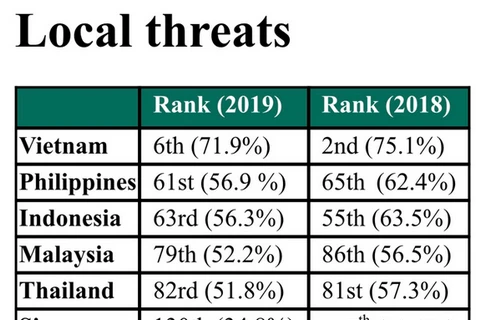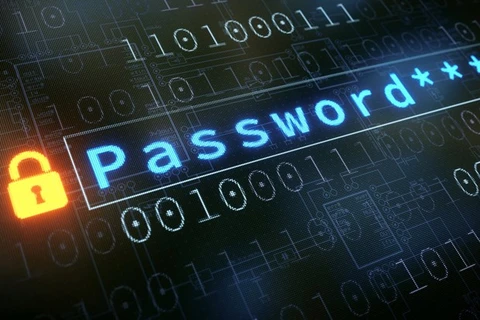Hanoi (VNS/VNA) - A number of firms have allowed their employees to work from home to protect them during the COVID-19 pandemic, which is increasing the risks to cybersecurity.
Working remotely may keep people safe, however, Vu The Binh, Vice Chairman of the Vietnam Internet Association tells Vietnam News: “Cybersecurity issues are more likely to arise as a result of people working from home, especially for those not using a company computer.”
Binh added: “A home computer is less likely to be set up as securely as a company one.”
“Most home computers contain more risks as they are used by other family members with low or no protection packages.”
The expert thought working from home could expose employees' devices and the company's network to threats on insecure public WiFi networks.
In January, the Ministry of Information and Communications (MIC) warned local internet users about cyber security, mentioning that various kinds of attacks still exist online and are able to harm users if they are careless. MIC reported 283 cyber-attacks against Vietnamese information systems in the first month of the year. In March, more cases were announced.
Besides the weaker protection at home, cyber security experts also warn about using social media as a working platform.
While Binh did not comment on the danger of people using social media like Facebook and Zalo to connect with colleagues, on March 24, according to local media, 41 million Vietnamese Facebook accounts were found leaked on RaidForums – a site on the dark web which is used to sell stolen information.
Binh told Vietnam News: “It is the best if staff use the office computer to work at home.”
However, it is not that easy.
Among those who are working from home during the pandemic, Truong Quynh Anh, a media planner for a foodstuff company in Hanoi says: “It is impossible to bring the computer in the office home, as it is sluggish and the procedures to bring something out of the office building is complicated.”
Anh still uses her own laptop with much of her own information, though she knows it is riskier.
She told Vietnam News: “I have no other choice. They don’t pay me to buy another laptop and I won’t spend on another one for a short period of time."
There is no data on the number of employees who are working from home during this period, but Binh thought “the trend is on the rise.”
In such a situation, Ngo Tran Vu, Director of Nam Truong Son Security Company, recommended firms and organisations which allowed their employees to work online set up a VPN that protects the company’s devices with virtual security software.
Vu said: “Companies may need to enforce two-factor authentication across all assets and for all employees.”
As cybersecurity plays an important role in the safety of a business, Vu added that: “With or without COVID-19, enterprises should give their employees regular and updated training about how to work securely from a distance as working from home is on the rise for sure.”/.
Working remotely may keep people safe, however, Vu The Binh, Vice Chairman of the Vietnam Internet Association tells Vietnam News: “Cybersecurity issues are more likely to arise as a result of people working from home, especially for those not using a company computer.”
Binh added: “A home computer is less likely to be set up as securely as a company one.”
“Most home computers contain more risks as they are used by other family members with low or no protection packages.”
The expert thought working from home could expose employees' devices and the company's network to threats on insecure public WiFi networks.
In January, the Ministry of Information and Communications (MIC) warned local internet users about cyber security, mentioning that various kinds of attacks still exist online and are able to harm users if they are careless. MIC reported 283 cyber-attacks against Vietnamese information systems in the first month of the year. In March, more cases were announced.
Besides the weaker protection at home, cyber security experts also warn about using social media as a working platform.
While Binh did not comment on the danger of people using social media like Facebook and Zalo to connect with colleagues, on March 24, according to local media, 41 million Vietnamese Facebook accounts were found leaked on RaidForums – a site on the dark web which is used to sell stolen information.
Binh told Vietnam News: “It is the best if staff use the office computer to work at home.”
However, it is not that easy.
Among those who are working from home during the pandemic, Truong Quynh Anh, a media planner for a foodstuff company in Hanoi says: “It is impossible to bring the computer in the office home, as it is sluggish and the procedures to bring something out of the office building is complicated.”
Anh still uses her own laptop with much of her own information, though she knows it is riskier.
She told Vietnam News: “I have no other choice. They don’t pay me to buy another laptop and I won’t spend on another one for a short period of time."
There is no data on the number of employees who are working from home during this period, but Binh thought “the trend is on the rise.”
In such a situation, Ngo Tran Vu, Director of Nam Truong Son Security Company, recommended firms and organisations which allowed their employees to work online set up a VPN that protects the company’s devices with virtual security software.
Vu said: “Companies may need to enforce two-factor authentication across all assets and for all employees.”
As cybersecurity plays an important role in the safety of a business, Vu added that: “With or without COVID-19, enterprises should give their employees regular and updated training about how to work securely from a distance as working from home is on the rise for sure.”/.
VNA
























